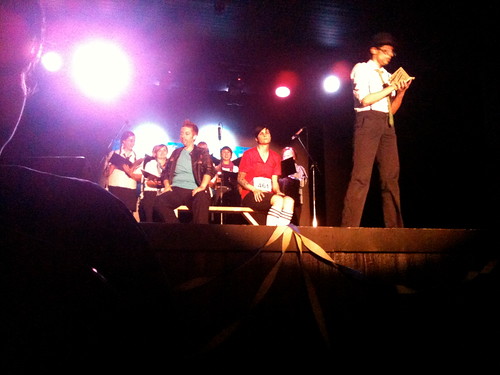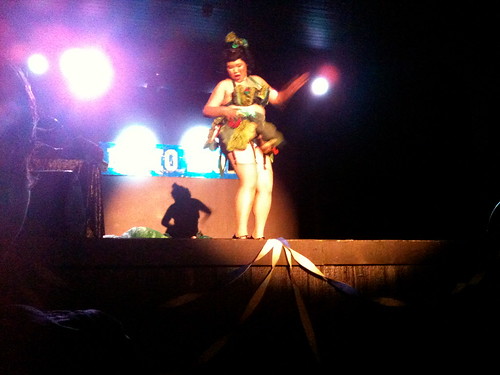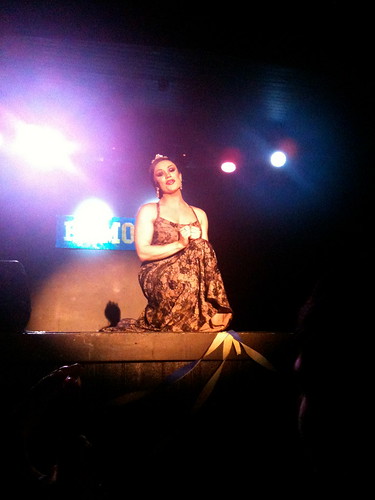The last show of the 2013 Vancouver Queer Arts Festival is a lesbian opera—apparently, the first lesbian opera in all of Canada! I hadn’t been planning to go until a friend invited me, and I’m very glad I accepted that invitation.
The last show of the 2013 Vancouver Queer Arts Festival is a lesbian opera—apparently, the first lesbian opera in all of Canada! I hadn’t been planning to go until a friend invited me, and I’m very glad I accepted that invitation.
First, the negative: I admit I’ve never seen opera, lesbian or otherwise (unless you count What’s Opera Doc?, in which case I’m totally an expert on Wagner’s Ring Cycle), and so far I’m not crazy about the genre. Yes, the vocal gymnastics were damn impressive, but all they did for me was to make the dialog hard to understand. If not for the lyrics projected on the back of the stage, I wouldn’t have been able to follow the story except in the most general sense. And it meant that most of the time, I was looking either at the written lyrics or the performers.
Now that that’s out of the way…
The story takes place in an unnamed country with an unnamed but deeply misogynistic religion, where women and men are largely segregated and any hint of homosexuality is punishable by death. (The show notes call the country “Fundamentalia” but that name was never mentioned in the play itself; for what it’s worth, to my ears the characters’ names sound kind of Persian / Central Asian.)
We’re first introduced to Solana, a tough, confident butch lesbian. Originally Canadian, she’s traveled the world, seduced lots of women, but always left before things got serious. This is how she’s always wanted it, but now the unexpected has happened: she’s fallen in love! Before leaving forever, she decides to visit her love’s home for one more night of passion, and perhaps take a memento for the road. Staying is definitely not an option, since Fundamentalia is not friendly to women like her.
Lilah is married, with a daughter, but before meeting Solana she had never known passion or love. When she comes to visit in the night, Lilah tries to send her away, but finds herself unable to resist her feelings. They kiss and settle on the bed, but then Lilah’s husband Javan comes home. He catches the two of them together, and immediately decides to kill both. Lilah manages to calm him down (Solana, more pragmatic, just takes his knife away) and all the secrets come out.
It turns out Javan has had lots of male lovers, about whom Lilah has been keeping quiet for both their sakes. He did find love, many years ago, but his lover was found out and beaten to death; ever since then, Javan has been wracked with grief and survivor guilt, unable to find joy in anything, even his fleeting trysts.
Gradually, the three come to an understanding. Lilah and Javan will keep each other’s secrets, supporting each other as needed (though it looks like the support will be mostly one-way; he’s far more damaged than she is). And Solana? She begs Lilah to come with her, away from this country that will kill her if she steps out of line. She can bring her daughter, raise her in a country where women and queers are free. Javan categorically refuses to give up his daughter, threatening again to kill Solana if she tries it, and Lilah is on his side this time. Because how free can she actually expect to be? Lilah argues that Solana is likely to get tired of her soon, leaving her alone in an unfamiliar country, far from her roots and her family. True, this country is difficult, but it’s not without its joys. Besides, if she stays she can work for real change.
Solana has a difficult choice. Should she stay safe and go home, leaving Lilah with her heart torn in two? Or should she stay, prove to Lilah and herself that she can be more than a love-’em-and-leave-’em woman, put down roots somewhere and make a positive difference in someone else’s world?
In the end, Solana chooses to stay. Not forever, but as long as she can bear life in an oppressive woman-hating country. She also invites Lilah to come to Canada at some point in the future, so she can see other ways of life and make a choice herself. And so the opera ends on a cautiously optimistic note: it’s not clear what the future will bring, but whatever happens we can be sure that Solana, Lilah and Javan will face it together.
When The Sun Comes Out is a love story, but there’s much more to it than that. The love that it portrays is not so much about passion, but about loyalty, openness and mutual support. It is a love that conquers fear, despair and, perhaps someday, an oppressive culture. And there’s no trite Happily Ever After, which I do appreciate. It’s better to bravely face an uncertain future than to relax in an unrealistic cliché.
Speaking of clichés, I also liked how the story steered away from Solana blithely sweeping Lilah off her feet, out of her marriage, her miserable oppressed life and into a bright future in the liberated West. There are no black and white answers; though she doesn’t love him in the same way she loves Solana, Lilah is committed to her husband and their daughter. The same religion that justifies killing queers and uppity women, is the religion that gives her strength. All the things that Solana sees as chains, that she’s been running from her whole adult life, Lilah knows are her roots. Solana’s freedom would be Lilah’s loneliness. Besides, no country is perfect; after all, wasn’t Solana herself kicked out of her parents’ house at a young age?
When The Sun Comes Out is a great milestone, and an amazing experience in its own right, moving and thoughtful, full of nuanced points and surprisingly complex themes. It is a true masterpiece, and I applaud Leslie Uyeda and Rachel Rose for having created it!


